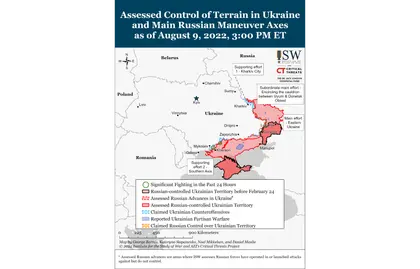Key Takeaways
- Russian forces conducted ground attacks to the southeast of Siversk and around Bakhmut.
- Russian forces conducted ground attacks north of Donetsk City and southwest of Donetsk City near the Zaporizhia-Donetsk Oblast border.
- Several large explosions hit Russian positions near Sevastopol and north of Crimea, but Russia did not blame Ukraine for them and Ukraine has not taken credit for them.
- Russia launched a surveillance satellite for Iran.
- Western media has reported that a Ukrainian counteroffensive is underway near Izyum, but the Ukrainian General Staff was notably completely silent about the area in its evening report.
- Russian sources suggested that recently-formed volunteer battalions are responsible for much of the Izyum sector.
- Ukrainian officials claimed that Russian forces continued to fire artillery systems from the Zaporizhzhia Nuclear Power Plant.
- Russian officials are continuing to take prominent roles in preparing for the sham referenda in Russian-occupied regions despite Kremlin claims that Russia is not conducting the referenda.
The Ukrainian General Staff made no mention of Izyum in its 1800 situational report on August 9, nor did other prominent Ukrainian sources despite Western sources’ claims of an ongoing Ukrainian counteroffensive in this area. This silence represents a noteworthy departure from previous Ukrainian coverage of the Kharkiv-Donetsk axis.
JOIN US ON TELEGRAM
Follow our coverage of the war on the @Kyivpost_official.
Russian and Ukrainian sources reported a series of large explosions deep within Russian-occupied Kherson Oblast and Crimea on August 9, but Ukrainian officials have not claimed responsibility for them as of the time of this publication. Social media users reported witnessing 12 loud explosions at the Saky airbase in Novofedorivka on the Crimean western coast.[1] Social media footage only showed the large cloud of smoke and the aftermath of the incident.[2] Social media footage also showed a large smoke cloud near Novooleksiivka in Henichensk district, in the vicinity of the Kherson Oblast-Crimean border.[3] Advisor to the Kherson Oblast Administration Serhiy Khlan reported that explosions occurred on the Russian ammunition base but noted that there is no official confirmation of Ukrainian involvement in the incident.[4]
The Russian Defense Ministry claimed that several aircraft munitions detonated in the storage areas of the Saky airbase due to poor fire protocol, rejecting reports that Ukrainian strikes or sabotage at the military facility caused the explosions.[5] The Russian Defense Ministry added that the incident did not result in any casualties or damage to Russian aviation equipment. The Russian Health Ministry claimed that five civilians were wounded in the incident, however.[6] Social media footage also showed firefighters extinguishing a burning plane, which also contradicts the original Russian Defense Ministry claim.[7] Russian-appointed Head of Crimea Sergey Aksyenov claimed that Russian officials are only evacuating a few residents in homes near the airbase, but social media footage showed long traffic jams approaching the Crimean bridge and the departure of several minibusses, reportedly with evacuees.[8] Russian propagandist Margarita Simonyan claimed that the incident was a result of sabotage rather than a missile or rocket strike.[9] Russian milbloggers voiced differing opinions regarding the origin of the strike, with some speculating that Ukrainian forces used US-provided long-range army tactical missile systems (ATACMS).[10] Ukrainian forces do not have the ATACMS systems, however.

Trump Makes 90 Day Foreign Aid Freeze – Ukraine Military Support Supposedly Untouched
The Kremlin has little incentive to accuse Ukraine of conducting strikes that caused the damage since such strikes would demonstrate the ineffectiveness of Russian air defense systems, which the Ukrainian sinking of the Moskva had already revealed. ISW does not yet have any basis independently to assess the precise cause of the explosions. The apparent simultaneity of explosions at two distinct facilities likely rules out the official Russian version of accidental fire, but it does not rule out either sabotage or long-range missile strike. Ukraine could have modified its Neptune missiles for land-attack use (as the Russians have done with both anti-shipping and anti-aircraft missiles), but there is no evidence to support this hypothesis at this time.
Russia launched an Iranian satellite into orbit on August 9 that could be used to provide military intelligence on Ukraine. Iranian Space Agency Head Hassan Salariyeh stated that the remote-sensing satellite, Khayyam, has a one-meter camera resolution.[11] Khayyam has already begun broadcasting telemetry data.[12] Iranian officials have denied that another state will have access to satellite feed at any point, but Western intelligence officials have claimed that Russian authorities will maintain access.[13]
Authors: Kateryna Stepanenko, Angela Howard, Katherine Lawlor, Karolina Hird, George Barros, and Frederick W. Kagan
See the full report here.
You can also highlight the text and press Ctrl + Enter










